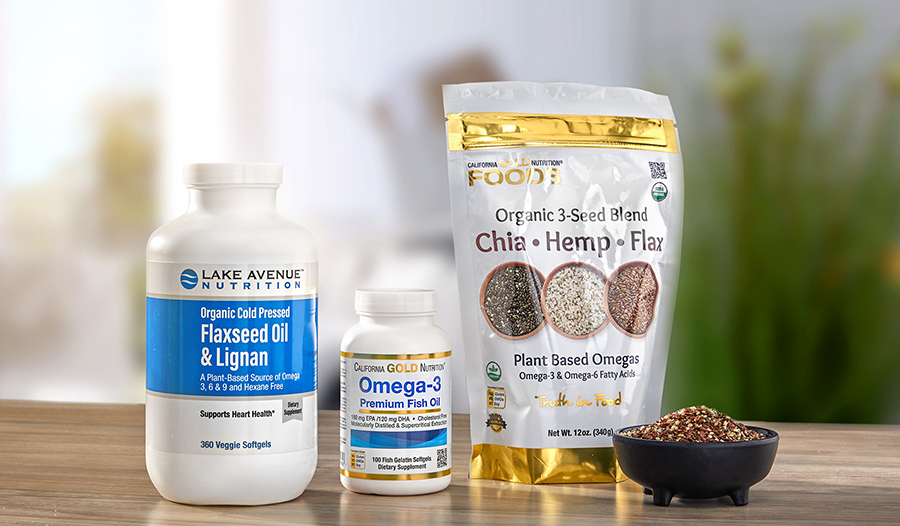Top 10 Sources of Omega-3: Which Is Right for You?

Omega fatty acids, or polyunsaturated fatty acids (PUFAs), comprise an important part of the human diet for many health reasons, most well known for heart health. They also promote brain health and cognition, proper growth and development in children, skin and hair health, and immune system health.
Omega-3 and 6 remain the most relevant for human health. Omega-9 is important as well; however, it can be made in the body so it receives less attention as a supplement. Omega fatty acids are named for their chemical structure.
3 Key Types of Omega-3 Fatty Acids
ALA
Alpha-linolenic acid (ALA) represents an omega-3 essential fatty acid (EFA), meaning we must consume it from food as our bodies cannot make it. ALA can be obtained from food sources in varying amounts. Common sources include perilla oil, flaxseed oil, hemp seed oil, chia seeds, black currant seed oil, and walnuts. These oils can become rancid easily, so they should be kept refrigerated, or fresh plant products should be processed immediately before consumption.
EPA & DHA
Eicosapentaenoic acid (EPA) and docosahexaenoic acid (DHA) can be made from ALA but should be consumed directly instead of relying on conversion, which can be minimal. EPA primarily offers anti-inflammatory benefits while DHA enhances brain health, the nervous system, and the eyes. Severe deficiency remains uncommon, but supplementation still has benefits.
EPA and DHA come best from seafood products, especially oily fish and certain shellfish. Wild fish offer better sources than commercially-fed farmed fish. Eggs, dairy, and meat also contain EPA and DHA but in much smaller amounts. Grass-fed livestock contains much more EPA and DHA than grain-fed. Fish obtain their omega oils from algae, one of the few plant sources of DHA.
Omega-6 Fatty Acids
Linoleic acid represents an omega-6 EFA, and all other omega-6 fatty acids can be synthesized from it — although in some medical conditions the conversion remains poor. The ability to metabolize these depends on having sufficient levels of zinc, magnesium, vitamin B6, niacin, and vitamin C. Excess intake of omega-6 fatty acids correlates with inflammation and increases the need for vitamin E.
Safflower oil, evening primrose oil, sunflower oil, wheat germ oil, hemp seed oil, corn oil, soybean oil, and canola oil offer the most common food sources of omega-6 linoleic acid.
Another important omega-6 oil, gamma-linolenic acid (GLA), most commonly comprises borage seed oil, black currant seed oil, and evening primrose oil.
A low ratio of omega-3 to omega-6 remains very common with modern western diets. You should balance the intake of these two fatty acids as they compete for absorption. This imbalance in recent history attributes to the increase in consumption of corn and other vegetable oils as well as eating meat products fed corn and other grains instead of allowing them to graze naturally.
Polyunsaturated fatty acids (PUFA) supplements may increase the risk of bleeding issues. Ask your doctor before taking if you have a blood disorder, take any kind of anticoagulant medication, or take aspirin regularly.
Top 10 Sources of Omega Fatty Acids
Consider some of the top supplements to help you increase your intake of omega fatty acids.
1. Fish oils
Fish oil supplements contain varying ratios of EPA and DHA depending on the fish source. The research on fish oil extends broadly, covering many areas of health. Examine a sampling:
- A 2016 study found that fish oil taken during pregnancy reduced the risk of preterm birth and low birth weight. Ask your obstetrician about taking fish oil during your pregnancy.
- A 2013 systematic review found a small, but statistically significant, decrease in blood pressure with fish oil supplements.
- A 2017 systematic review and meta-analysis of 17 studies with 672 participants found that fish oil supplements can support insulin sensitivity in people with metabolic disorders.
2. Flaxseed
Flaxseed, also known as linseed, or Linum usitatissimum, contains rich nutrients and has many uses related to dryness of the skin, lungs, and intestines as well as maintaining heart health. Ground flax seeds or oil can be helpful internally for constipation, dry cough, and optimizing hormonal health. Topically, it treats skin conditions. Flax turns rancid easily and should be ground fresh and used immediately. In terms of omega fatty acid usage, it remains best as a source of ALA — not converting well to EPA and DHA.
3. Chia Seeds
Chia seeds, or Salvia hispanica, contain rich ALA. A 2018 study in rats found that after 13 months, rats that consumed a diet consisting of 10% chia seeds had significantly improved bone mineral density compared to the rats that did not consume chia. Other markers in this study showed benefits in liver health, muscle health, and body weight with chia seed consumption. Another 2018 systematic review and meta-analysis found that when consumed in large amounts, chia seeds may help to balance blood sugar, cholesterol, and blood pressure levels.
4. Evening Primrose Oil
Evening Primrose Oil (EPO), or Oenothera biennis, contains rich omega-6 GLA. It has been studied for use in skin conditions with mixed results. It may be most useful in people who have a deficiency in the enzyme delta-6-desaturase, which converts from linoleic acid to GLA. It is also frequently cited for use in reproductive and hormonal conditions with inconclusive results. More research needs to be conducted to understand the benefits of EPO.
5. Hemp Seed Oil
Hemp Seed Oil has been studied for use in atopic dermatitis. In a 2005 study, patients consumed hemp seed oil for 20 weeks. Their blood levels of PUFAs improved throughout the study. Patients reported a decrease in skin dryness, itchiness, and used less topical medication. Consuming hemp seed oil may help maintain healthy skin.
6. Borage
Borage, or Borago officinalis, is a plant native to the eastern hemisphere rich in GLA. The herb has many traditional uses, often processed into an oil. It can be used to maintain heart health, stimulate lactation, and support recovery from generalized exhaustion from overwork.
7. Perilla Oil
A year-long study of Japanese subjects found that supplementing Perilla Oil, or Perilla frutescens, rich in ALA, had beneficial effects on both blood values of EFAs and neurotransmitters. Study participants also reported a significant positive effect on their mood and sense of mental well-being.
8. Black Currant Seed Oil
Black Currant Seed Oil, or Ribes nigrum, contains rich GLA and ALA; however, research remains limited and mostly inconclusive. It has been studied as a treatment for rheumatoid arthritis with mildly positive results. Some evidence notes that taking black currant seed oil while breastfeeding decreases atopic dermatitis in breastfed infants. In a study in healthy elderly people, black currant seed oil yielded a mild positive effect on the immune system response.
9. Walnuts
Walnuts have received much attention recently as a superfood. They offer a great source of ALA, and research has shown them beneficial for maintaining heart health, brain health, and as an anti-inflammatory.
A 2004 study found that consuming walnuts may help lower cholesterol and strengthen the health of blood vessels. They represent an excellent food for maintaining cardiometabolic health.
A study of young, healthy, normal adults found a significant increase in inferential reasoning abilities while consuming walnuts. However, no effect remained on memory or mood.
Multiple studies have looked into walnuts and neurological disease. Some found minimal positive results, while others have noted that consuming walnuts may have a beneficial effect on brain health and maintaining healthy cognition as we age.
10. Algal Oil
A 2012 meta-analysis found that algal oil, a rich source of DHA, can reduce triglycerides and raise both HDL and LDL cholesterol levels in people who do not have heart disease. Another 2008 study found the DHA levels in algae raise blood markers of DHA as effectively as salmon, making this a good potential alternative to fish oils.
Essential fatty acids have numerous health benefits, and many of them can be obtained directly from food. Supplementation has been studied extensively, and more research continues to be added perpetually. Ask your doctor about supplementing with EFAs for optimizing your health.
References:
- Arterburn LM, Oken HA, Bailey Hall E, Hamersley J, Kuratko CN, Hoffman JP. Algal-oil capsules and cooked salmon: nutritionally equivalent sources of docosahexaenoic acid. J Am Diet Assoc. 2008;108(7):1204-1209. doi:10.1016/j.jada.2008.04.020
- Bernstein AM, Ding EL, Willett WC, Rimm EB. A meta-analysis shows that docosahexaenoic acid from algal oil reduces serum triglycerides and increases HDL-cholesterol and LDL-cholesterol in persons without coronary heart disease. J Nutr. 2012;142(1):99-104. doi:10.3945/jn.111.148973
- Black Currant Seed Oil. In: Drugs and Lactation Database (LactMed). Bethesda (MD): National Library of Medicine (US); December 3, 2018.
- Callaway J, Schwab U, Harvima I, et al. Efficacy of dietary hempseed oil in patients with atopic dermatitis. J Dermatolog Treat. 2005;16(2):87-94. doi:10.1080/09546630510035832
- Campbell F, Dickinson HO, Critchley JA, Ford GA, Bradburn M. A systematic review of fish-oil supplements for the prevention and treatment of hypertension. Eur J Prev Cardiol. 2013;20(1):107-120. doi:10.1177/2047487312437056
- Chauhan A, Chauhan V. Beneficial Effects of Walnuts on Cognition and Brain Health. Nutrients. 2020;12(2):550. Published 2020 Feb 20. doi:10.3390/nu12020550
- Chen B, Ji X, Zhang L, Hou Z, Li C, Tong Y. Fish oil supplementation improves pregnancy outcomes and size of the newborn: a meta-analysis of 21 randomized controlled trials. J Matern Fetal Neonatal Med. 2016;29(12):2017-2027. doi:10.3109/14767058.2015.1072163
- Gaby A. Nutritional Medicine. Concord, NH: Fritz Perlberg Publishing; 2011.
- Gao H, Geng T, Huang T, Zhao Q. Fish oil supplementation and insulin sensitivity: a systematic review and meta-analysis. Lipids Health Dis. 2017;16(1):131. Published 2017 Jul 3. doi:10.1186/s12944-017-0528-0
- Hashimoto M, Matsuzaki K, Kato S, Hossain S, Ohno M, Shido O. Twelve-month Studies on Perilla Oil Intake in Japanese Adults-Possible Supplement for Mental Health. Foods. 2020;9(4):530. Published 2020 Apr 22. doi:10.3390/foods9040530
- Kerscher MJ, Korting HC. Treatment of atopic eczema with evening primrose oil: rationale and clinical results. Clin Investig. 1992;70(2):167-171. doi:10.1007/BF00227362
- Leventhal LJ, Boyce EG, Zurier RB. Treatment of rheumatoid arthritis with blackcurrant seed oil. Br J Rheumatol. 1994;33(9):847-852. doi:10.1093/rheumatology/33.9.847
- Montes Chañi EM, Pacheco SOS, Martínez GA, et al. Long-Term Dietary Intake of Chia Seed Is Associated with Increased Bone Mineral Content and Improved Hepatic and Intestinal Morphology in Sprague-Dawley Rats. Nutrients. 2018;10(7):922. Published 2018 Jul 19. doi:10.3390/nu10070922
- Pribis P, Bailey RN, Russell AA, et al. Effects of walnut consumption on cognitive performance in young adults. Br J Nutr. 2012;107(9):1393-1401. doi:10.1017/S0007114511004302
- Ros E, Izquierdo-Pulido M, Sala-Vila A. Beneficial effects of walnut consumption on human health: role of micronutrients. Curr Opin Clin Nutr Metab Care. 2018;21(6):498-504. doi:10.1097/MCO.0000000000000508
- Ros E, Núñez I, Pérez-Heras A, et al. A walnut diet improves endothelial function in hypercholesterolemic subjects: a randomized crossover trial. Circulation. 2004;109(13):1609-1614. doi:10.1161/01.CIR.0000124477.91474.FF
- Sala-Vila A, Valls-Pedret C, Rajaram S, et al. Effect of a 2-year diet intervention with walnuts on cognitive decline. The Walnuts And Healthy Aging (WAHA) study: a randomized controlled trial. Am J Clin Nutr. 2020;111(3):590-600. doi:10.1093/ajcn/nqz328
- Stonemetz D. A review of the clinical efficacy of evening primrose. Holist Nurs Pract. 2008;22(3):171-174. doi:10.1097/01.HNP.0000318026.45527.07
- Teoh SL, Lai NM, Vanichkulpitak P, Vuksan V, Ho H, Chaiyakunapruk N. Clinical evidence on dietary supplementation with chia seed (Salvia hispanica L.): a systematic review and meta-analysis. Nutr Rev. 2018;76(4):219-242. doi:10.1093/nutrit/nux071
- Wood M. The Earthwise Herbal, a Complete Guide to Old World Medicinal Plants. Berkeley, CA: North Atlantic Books; 2008.
- Wu D, Meydani M, Leka LS, et al. Effect of dietary supplementation with black currant seed oil on the immune response of healthy elderly subjects. Am J Clin Nutr. 1999;70(4):536-543. doi:10.1093/ajcn/70.4.536
DISCLAIMER:This Wellness Hub does not intend to provide diagnosis...
















































































 Table of Contents
Table of Contents
















